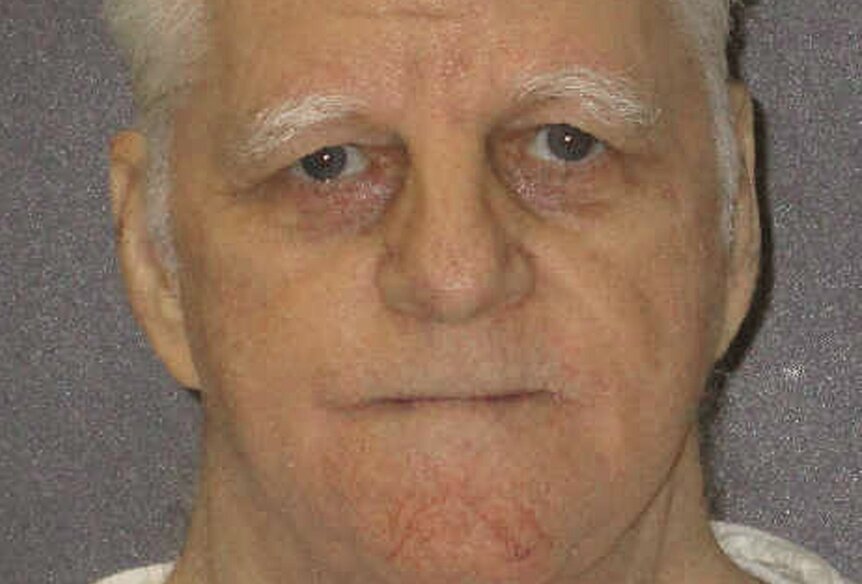Create a free profile to get unlimited access to exclusive videos, breaking news, sweepstakes, and more!
Bizarre Last Words, Chaotic Brawl Mark Execution Of Oldest Inmate Ever To Be Put To Death In Texas
When Billie Wayne Coble finished speaking prior to receiving his lethal injection, his son, a friend and a daughter-in-law became emotional, throwing fists and kicking at others in the death chamber witness area; the two men were arrested on charges of resisting an officer.
Before he was executed by lethal injection on Thursday evening, Billie Wayne Coble had some cryptic last words for his loved ones.
“That will be five dollars,” said Coble, a Vietnam War veteran who killed his estranged wife’s parents and brother and threatened to do the same to her, before uttering a string of “I love yous” and then bidding the five witnesses present to “take care,” according to the Houston Chronicle.
It’s not exactly clear what Coble meant, but the Chronicle speculated that it could be a reference to his nickname, "$5 Bill."
When he finished speaking, his son Gordon Coble, a friend and a daughter-in-law became emotional, throwing fists and kicking at others in the death chamber witness area. Officers stepped in but the witnesses continued to resist and were eventually moved to a courtyard where two of the men were handcuffed. They were arrested on charges of resisting an officer.
"Why are you doing this?" the woman asked. "They just killed his daddy."
As the men were being subdued outside, a single dose of pentobarbital was being administered to Coble. He gasped several times and began snoring inside the death chamber at the state penitentiary in Huntsville. He was pronounced dead 11 minutes later, at 6:24 p.m.
The 70-year-old Coble was the oldest inmate executed by Texas since the state resumed carrying out capital punishment in 1982. Prosecutors once described Coble as having "a heart full of scorpions."
He was convicted three decades ago for the August 1989 shooting deaths of Robert and Zelda Vicha, and their son, Bobby Vicha, at separate homes in Axtell, which is northeast of Waco.
The bloodshed began when Coble, distraught over his pending divorce, kidnapped his wife, Karen Vicha. He was arrested and later freed on bond.
Nine days after the kidnapping, Coble went to her home, where he handcuffed and tied up her three daughters and nephew, J.R. Vicha, according to investigators.
Coble then went to the homes of Robert and Zelda Vicha, 64 and 60 respectively, and Bobby Vicha, 39, who lived nearby, and fatally shot them.
After Karen Vicha returned home, Coble abducted her again. He drove away, assaulted her and threatened to rape and kill her. He was arrested after wrecking the vehicle in neighboring Bosque County following a police chase.
Coble was convicted of capital murder in 1990. An appeals court ordered a new trial on punishment in 2007, but a second jury also sentenced him to death.
J.R. Vicha, Bobby Vicha's son, was 11 when he was tied up and threatened by Coble during the killings. Coble's execution would be a relief, said Vicha, who eventually became a prosecutor in part because of his father.
"Still, the way they do it is more humane than what he did to my family. It's not what he deserves, but it will be good to know we got as much justice as allowed by the law," he said ahead of the execution.
"This is not a happy night," added McLennan County District Attorney Barry Johnson. "This is the end of a horror story for the Vicha family."
On Thursday, the U.S. Supreme Court turned down Coble's request to delay his execution. His attorneys had argued that Coble's original trial lawyers were negligent for conceding his guilt by failing to present an insanity defense.
The Texas Board of Pardons and Paroles also turned down his request for a commutation.
Coble's attorney, A. Richard Ellis, told the courts that Coble suffered from post-traumatic stress disorder stemming from his time as a Marine during the Vietnam War. Ellis argued that Coble was convicted in part because of misleading testimony from two prosecution expert witnesses on whether he would be a future danger.
Brian Stull, of the American Civil Liberties Union, wrote about Coble’s case earlier this week.
“That Coble will be executed on such discredited testimony is unconscionable,” Stull wrote on Tuesday. “But the example of his case already shows all who are willing to look why the death penalty is never justice, and why it should be abolished once and for all.”
Coble was the third inmate put to death this year in the U.S. and the second in Texas, the nation's busiest capital punishment state.
The Associated Press contributed to this report.






























